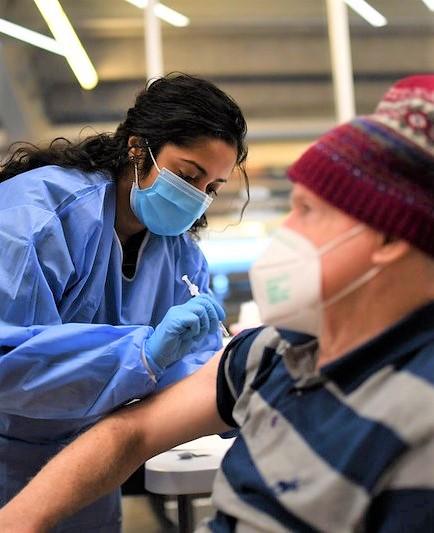A pair of new studies detail COVID-19 vaccine effectiveness, one showing 85% protection against hospitalization and the other describing waning efficacy for three vaccine types against infection and death caused by the highly transmissible Delta (B1617.2) variant among US veterans.
84% of hospitalizations in unvaccinated
The first study, published yesterday in JAMA, was led by researchers from the Centers for Disease Control and Prevention (CDC) COVID-19 Response Team.
It involved 4,513 hospitalized coronavirus patients at 21 sites in 18 US states from Mar 11 to Aug 15, 2021, with a 28-day follow-up period. The Delta variant became the predominant US strain in early July.
Of the 4,513 patients, 1,983 were diagnosed as having COVID-19, and 2,530 were uninfected controls. Median patient age was 59 years, 48.8% were women, 23.0% were Black, 15.9% were Hispanic, and 20.1% had an underlying medical condition.
Patients who received two doses of either the Pfizer/BioNTech or Moderna mRNA vaccine had an adjusted odds ratio (aOR) of 0.15 for hospitalization owing to COVID-19 versus an alternative diagnosis. Fully vaccinated COVID-19 hospital patients had an aOR of 0.33 for death or the need for invasive mechanical ventilation.
Unvaccinated patients made up 84.2% of COVID-19 hospital admissions. Hospitalization was significantly linked with a lower likelihood of vaccination, with 15.8% of infected patients and 54.8% of controls, including for the SARS-CoV-2 Alpha (B117) variant (8.7% vs 51.7%; aOR, 0.10) and Delta variant (21.9% vs 61.8%; aOR, 0.14).
This link between hospitalization and lower likelihood of vaccination was more robust for patients with healthy immune systems (11.2% vs 53.5%; aOR, 0.10) than for immunocompromised patients (40.1% vs 58.8%; aOR, 0.49) and weaker more than 120 days after receipt of the Pfizer vaccine (5.8% vs 11.5%; aOR, 0.36) than after receipt of the Moderna vaccine (1.9% vs 8.3%; aOR, 0.15).
Of 1,197 hospitalized COVID-19 patients, death or invasive mechanical ventilation by day 28 was much more common in the unvaccinated (24.7% vs 12.0%; aOR for vaccinated patients, 0.33).
Vaccines largely prevent severe disease
The authors said that understanding the benefits of COVID-19 vaccination requires estimation of disease attenuation, defined as whether people who test positive for COVID-19 despite vaccination have less severe disease than unvaccinated people.
"Vaccination with an mRNA COVID-19 vaccine was significantly less likely among patients with COVID-19 hospitalization and with disease progression to death or invasive mechanical ventilation," the researchers concluded. "These findings are consistent with risk reduction of developing severe COVID-19 among vaccine breakthrough infections compared with absence of vaccination."
In a related editorial, Michael Klompas, MD, MPH, of Harvard Medical School, said the study findings are both reassuring and worrisome. "The reassurance is that mRNA vaccines are highly effective against hospitalizations, that this benefit is preserved against the Delta variant, and that when breakthrough infections lead to hospitalization, the clinical course is milder and less likely to require intubation or culminate in death," he wrote.
The concern, he said, lies with the much lower mRNA vaccine effectiveness in preventing hospital admissions for immunocompromised COVID-19 patients and that "protection against hospitalizations for all people may wane over time, particularly for the mRNA BNT162b2 [Pfizer] vaccine. Fortunately, emerging data suggest boosters may mitigate these risks."
Breakthrough infections in 5% of fully vaccinated
The second study, published yesterday in Science, evaluated the effectiveness of the Pfizer, Moderna, and Johnson & Johnson (J&J) COVID-19 vaccines among 780,225 patients in the US Veterans Health Administration system, covering 2.7% of the US population, from February to October, 2021.
A team led by Public Health Institute researchers said they conducted the study to address the gap in national breakthrough infection data since the CDC shifted from tracking and investigating all such infections to only those involving hospitalization or all-cause deaths in May 2021.
Over that time, overall vaccine effectiveness fell from 87.9% to 48.1%, with the steepest decline in recipients of the J&J vaccine, which dropped from 86.4% to 13.1%, followed by Moderna (89.2% to 58.0%), and Pfizer (86.9% to 43.3%). The results were the same regardless of age, sex, and the presence of chronic conditions.
While breakthrough infection increased the risk of COVID-19 death, vaccination still protected against death in patients infected amid the Delta surge, which began in July. Vaccine effectiveness against death for patients 65 years old was 73.0% for J&J, 81.5% for Moderna, and 84.3% for Pfizer from July to October. During that same period, effectiveness against death for those 65 and older was 52.2% for J&J, 75.5% for Moderna, and 70.1% for Pfizer.
Overall, 26,114 breakthrough COVID-19 infections occurred in 498,148 fully vaccinated veterans (5.2%), with rates higher in those who received the J&J vaccine compared with the Pfizer or Moderna vaccine.
Veterans at highest risk for infection were unvaccinated (25.8%), women (18.2%), Hispanic (18.0%), American Indian or Alaska Native (18.2%) or Native Hawaiian/Pacific Islander (17.8%), age younger than 50 years at diagnosis (22.2%), and had a lower comorbidity score (19.2% for a Charlson Comorbidity Index of 0).
The researchers said that the patterns of breakthrough COVID-19 infections among vaccinated veterans reveal a worrisome trend after the emergence and dominance of Delta.
"Although others have demonstrated high VE-I [effectiveness against infection] and VE-D [effectiveness against death] in Veterans during vaccine rollout through mid-March 2021, our results suggest vaccines are less effective in preventing infection associated with the Delta variant," they wrote.





















